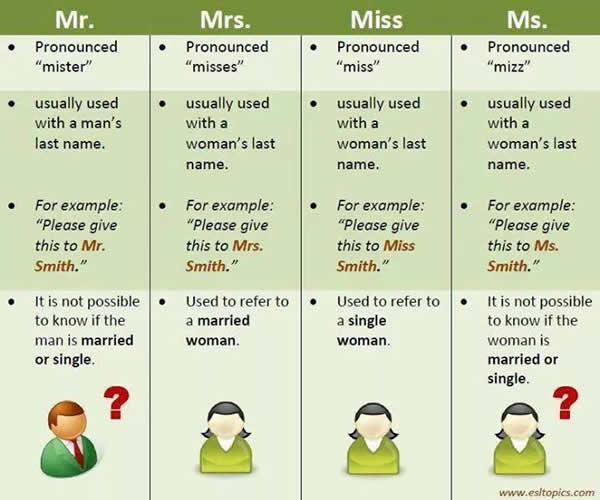
MS MR MS MR Photo (31807726) Fanpop
What's the difference between Miss, Mrs., and Ms.? Learn the ins and outs of Ms. vs Miss and Ms. vs Mrs. Includes examples of when to use each term.

Uses of 'Mr.', 'Mrs.', 'Miss.' and 'Ms.' English Learn Site
Learn the Difference: "Miss," "Mrs.," "Ms.," and "Mx." Grammarly Updated on May 8, 2023 Grammar The feminine terms Miss, Mrs., and Ms. and the gender-neutral term Mx., along with their masculine counterpart Mr., are known as courtesy titles.

How to Use Personal Titles Mr., Mrs., Ms. and Miss ESL Buzz
It's wonderful to meet you, Ms. Ruiz. Mx. The prefix "Mx." was added to Merriam-Webster Unabridged in 2016 (although it appeared in print as early as the late '70s.) The designation functions as a gender-neutral substitute to titles like "Mr." and "Ms." And—similar to "Ms."—it does not indicate marital status.

MS MR interview
Mrs. (pronounced MIS-iz) is a form of abbreviated address that specifies a married woman. Where we can also refer to a married woman as Ms., we would not refer to a single woman as Mrs. Mrs. has no standard spelling. In nonfictional quotations and dialogue, Mrs. will typically retain its abbreviated form. When used in fictional dialogue, it.
MS MR Tour Dates 2016 2017 concert images & videos
Historically, "Miss" has been the formal title for an unmarried woman, while "Mrs." refers to a married woman. "Ms." is used by and for unmarried and married women.

MS MR Returns for Rescheduled Show 303 Magazine
We use titles like 'Miss', 'Mrs', 'Ms' and 'Mr' when using someone's first name could sound too familiar. For instance, when addressing someone you don't know well, you might say 'Dear Ms Turner' rather than 'Dear Sophie'. But there are rules about how to use these titles in your writing. Common female honorifics.

Pin on MS MR
Personal titles like Mr, Mrs, Ms, and Miss are more than just words; they carry cultural, social, and historical weight. Understanding the nuances behind these titles can help you navigate the intricacies of addressing people in different contexts. Let's embark on this journey to unravel the meanings of these titles. Mr: The Universal Mister

MS MR Updates (msmrupdates) Twitter
Mr., Mrs., Ms., and Miss are titles that are used before surnames or full names as a sign of respect. Mr. is a title used before a surname or full name of a male, whether he is married or not. Mr. is an abbreviation for Mister, it is pronounced like the word Mister. Mrs. is a title used before a surname or full name of a married female.

MS MR MS MR Photo (31807723) Fanpop
We use titles like 'Miss', 'Mrs', 'Ms' and 'Mr' when using someone's first name could sound too familiar. For instance, when addressing someone you don't know well, you might say 'Dear Ms Turner' rather than 'Dear Sophie'. But there are rules about how to use these titles in your writing. Common female honorifics.

Image of Ms Mr
The abbreviation Mrs. has been in use since the sixteenth century, it is a variant of the word mistress. Ms. Ms. is a title used before a surname or full name of a female whether she is married or not. Ms. has been in use since the 1950s, it is a portmanteau of the words Miss and Missus.

MS MR News
In the English language, an honorific is a form of address conveying esteem, courtesy or respect. These can be titles prefixing a person's name, e.g.: Mr, Mrs, Miss, Ms, Sir, Dame, Dr, Cllr, Lady, or Lord, or other titles or positions that can appear as a form of address without the person's name, as in Mr President, General, Captain, Father, Doctor, or Earl.

ms mr
The abbreviation Mr. comes from Middle English, where it was the abbreviation of maister, meaning "master." Master was the original preferred title for young unmarried men, and mister was specific to those who were married, until the former fell out of use and the latter came to apply to both.

MS MR (msmrsounds) Twitter
Mr. and Mrs. are typically used as titles or honorifics before a person's name to show respect. Traditionally, Mr. is used before the names of men and boys while Mrs. is used before the names of married women. The contraction Mr. has been used since the 1500s. Mr. was used as a shortening of master, a title used for men of high authority.

MS MR "Track Addict Vol. 1 Mixtape" Pigeons & Planes
Mx. is a riff on the classic gendered titles Mr. and Ms. It keeps the M and swaps the gendered element of these terms for the gender-neutral X. The letter X has historically been used as a symbol for the unknown or indescribable. In this way, it is perfect for a gender-neutral honorific. Mx. shows respect while leaving the gender unknown or.
Sweet Sound Bites MS MR The Independent 10/16/2013
"Miss", "Mrs", "Ms" and "Mr" are all honorific titles used before a person's name to indicate their marital status and/or respect for them."Miss" is used for.

MS MR bei Amazon Music
What is the Difference Between Ms. and Mrs.? In this post, I will compare Ms. vs. Mrs. I will outline the appropriate contexts in which to use each of these titles, and I will use each of hem in a few example sentences. Also, I will show you a memory tool that can help you decide whether to use Mrs. or Ms. in your own writing. When to Use Ms.